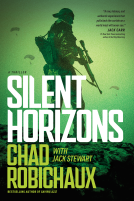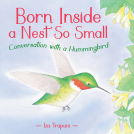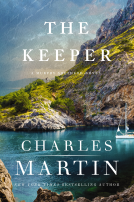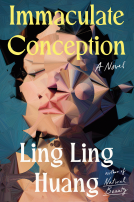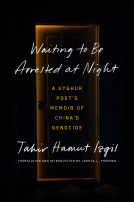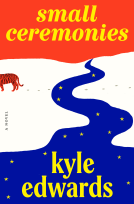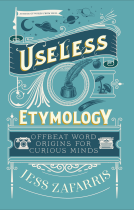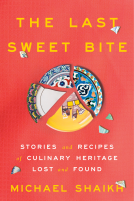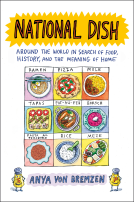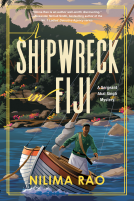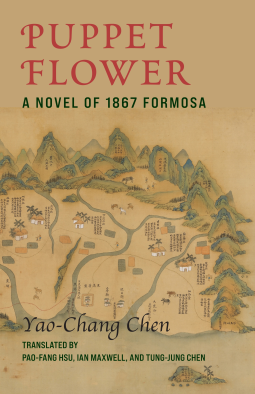
Puppet Flower
A Novel of 1867 Formosa
by Chen Yao-chang
This title was previously available on NetGalley and is now archived.
Send NetGalley books directly to your Kindle or Kindle app
1
To read on a Kindle or Kindle app, please add kindle@netgalley.com as an approved email address to receive files in your Amazon account. Click here for step-by-step instructions.
2
Also find your Kindle email address within your Amazon account, and enter it here.
Pub Date Apr 11 2023 | Archive Date Jul 19 2023
Talking about this book? Use #ColumbiaUP #NetGalley. More hashtag tips!
Description
In 1867, an American merchant ship, the Rover, sank off the coast of southern Taiwan. Fourteen sailors reached the shore, where almost all were killed by indigenous people. In retaliation, the United States launched two disastrous military operations against local tribes. Eventually, the U.S. consul to Amoy, Charles Le Gendre, negotiated a treaty with Tauketok, the chief of the eighteen tribes of the area, that secured safe passage for shipwrecked sailors.
Yao-Chang Chen’s historical novel Puppet Flower retells the story of the Rover incident, bringing to light its pivotal role in Taiwanese history. Merging documented events and literary imagination, the novel vividly depicts Tauketok, Le Gendre, and other historical figures alongside the story of Butterfly, a young woman of mixed ethnic heritage who serves as an interpreter and mediator during the crisis. Chen deftly reconstructs the multiethnic and multilingual society of southern Taiwan in the second half of the nineteenth century from multiple perspectives, portraying local people’s daily struggles for survival and their interactions with Han Chinese settlers, Qing dynasty bureaucrats, and Western officials, tradesmen, and adventurers. The novel explores nineteenth-century Sino-American and Sino-indigenous relations and emphasizes the centrality of Taiwanese indigenous cultures to the island’s history.
A gripping work of historical fiction, Puppet Flower is a powerful revisionist narrative of a formative moment in Taiwan’s past. It was recently adapted into a popular Taiwanese TV miniseries, Seqalu: Formosa 1867.
About the author and translators:
Yao-Chang Chen is professor emeritus of medicine at National Taiwan University and is a leading specialist in blood cell diseases. He began writing novels in his sixties, becoming a prolific and acclaimed author of historical fiction.
Pao-fang Hsu has translated works including Chung Wen-yin’s Decayed Land and The Anthology of Taiwan Indigenous Literature.
Ian Maxwell graduated from Lancaster University; he lives and works in Taipei.
Tung-jung Chen is a retired professor of English who taught American literature at Taiwanese universities.
Advance Praise
"This well-wrought book transports us to a complicated yet majestic period in Taiwan’s history. A significant novel, steeped in this unique place while echoing around the world."—Lu Ping, author of Love and Revolution: A Novel About Song Qingling and Sun Yat-sen
"Was Formosa a place too treacherous to visit? The author of Puppet Flower boldly takes up this question and tries to answer it from various perspectives, most notably that of the island's indigenous peoples. Strongly recommended!"— Li Ang, author of The Lost Garden: A Novel
"This engaging historical novel shows how a small event on a remote island can make history."—Ping-hui Liao, Chuan Lyu Endowed Chair in Taiwan Studies, University of California, San Diego
"In the novel Puppet Flower, Chen explores the complex intersection of international politics and cross-cultural exchange in mid-nineteenth century Taiwan. By imagining the contributions of a mixed-race sibling pair, Chen brings to life the actions and complex societies of indigenous and plains peoples at the threshold of new forms of colonialism."—Margaret Mih Tillman, author of Raising China's Revolutionaries: Modernizing Childhood for Cosmopolitan Nationalists and Liberated Comrades, 1920s-1950s
Available Editions
| EDITION | Other Format |
| ISBN | 9780231208512 |
| PRICE | $26.00 (USD) |
Available on NetGalley
Featured Reviews
When most people think about Taiwan (formerly Formosa) nowadays, they likely think of the conflict between them and China and the constant threat of attack. Yet this book, which has been translated from Chinese into English, gives us a broader perspective. It is historical fiction and based closely on the real-life events. Much is seen of the fearsome aborigines of 1867, whom in many ways had gotten a bad rap and who inhabited a large swathe of the island, especially the mountain areas.
Their woe was when one group, the Koalut tribe massacred survivors of the American ship, the Rover, in mistaken retaliation of Red-Hairs who'd killed many of their people years ago. This got American, British and the Qing goverment involved. It tells also of the Hokkien and Hakka people who'd come over from the China mainland, and took up more territory, encroaching on tribal land, adding further aggravation.
What initially sparked my interest in this book was the title, Puppet Flower - a nickname for Butterfly, the daughter of a Hakka man and a "raw savage" mother, who'd hailed from the Puppet Mountains. She had a brother Bunkiet who was also a major story character along with Tauketok, Pickering, General Charles LeGendre, and General Liu, who represented the Qing government. These all figured in the balance of 'to war or not to war' due to the Rover incident.
In later years, Taiwan was taken over by the Japanese, adding a whole new kettle of fish.
Some places of the book dragged a bit, however, I was mostly kept interested all along the way. Was somewhat disappointed with the ending as it became more about Le Gendre and less about Butterfly, the Puppet Flower. All in all, it was a statisfying read and I learned more about Taiwan and it's strategic position in the world.
~Eunice C., Reviewer/Blogger~
October 2022
Disclaimer: This my honest opinion based on the complimentary copy sent by NetGalley and the Publisher.
Readers who liked this book also liked:
Ling Ling Huang
General Fiction (Adult), Humor & Satire, Multicultural Interest
Tahir Hamut Izgil
Biographies & Memoirs, History, Nonfiction (Adult)
